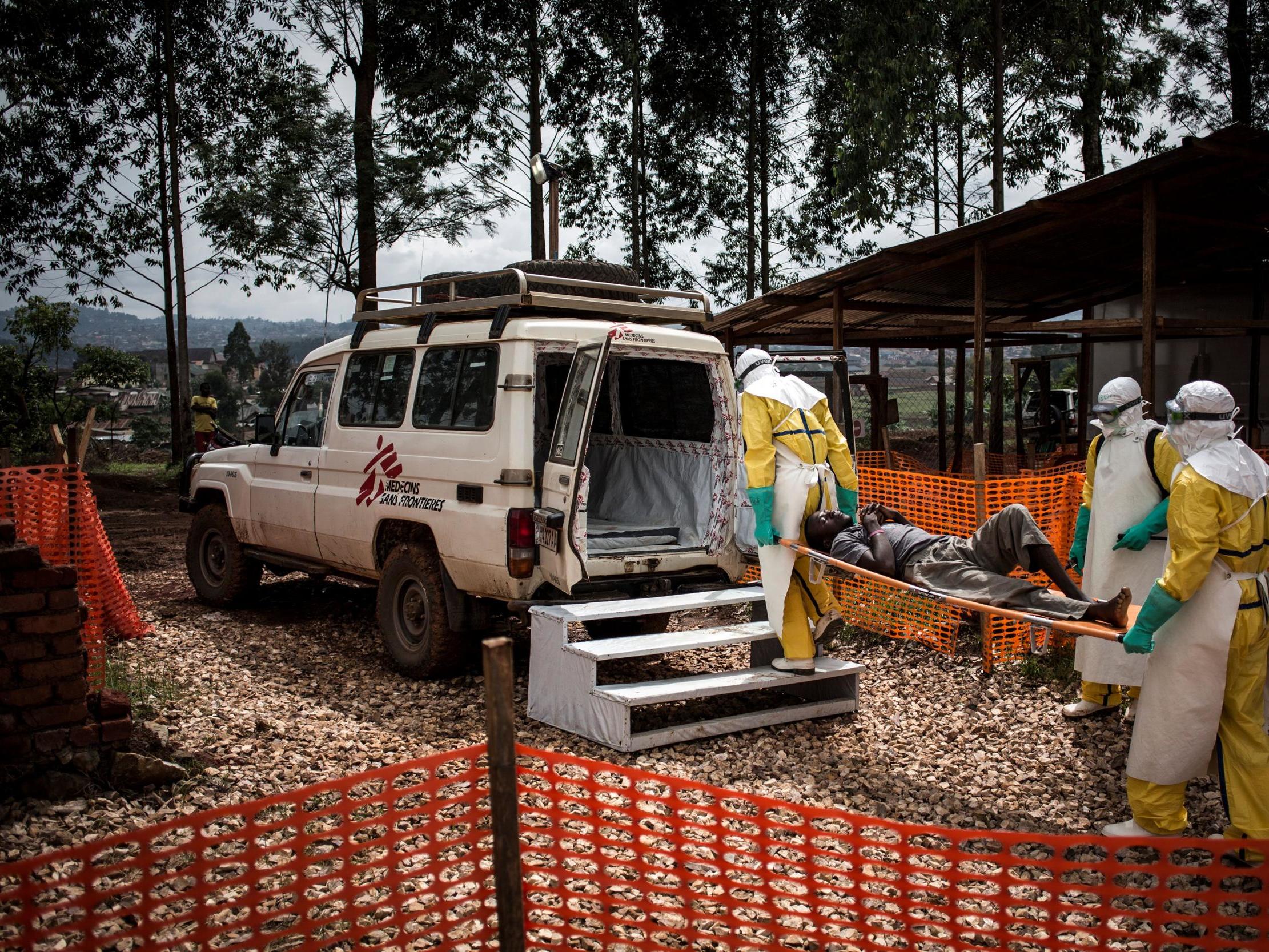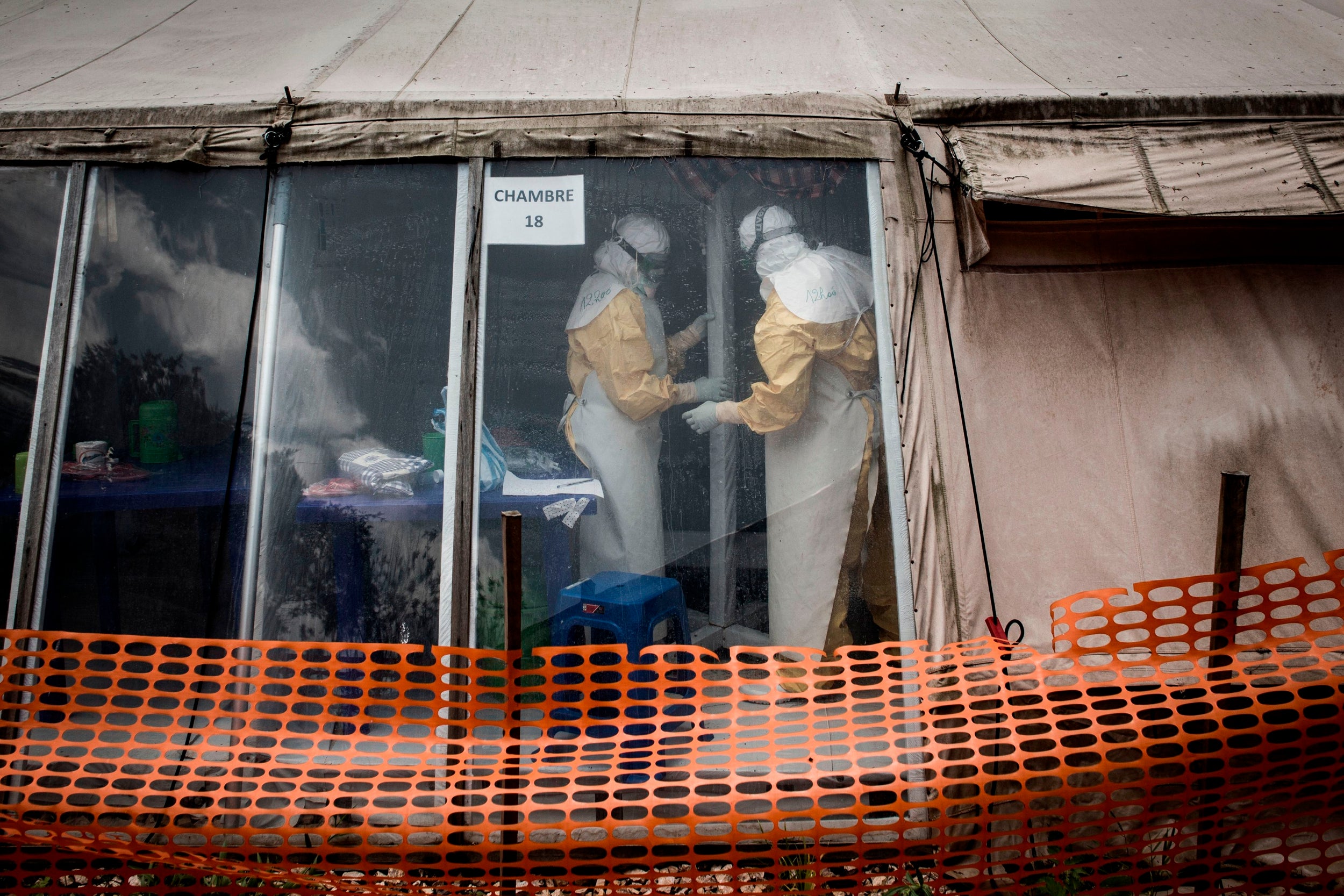'Race against the clock': How the Covid-19 pandemic threatens to undermine DRC's response to latest Ebola outbreak
Democratic Republic of Congo facing ‘perfect storm’ of health crises, with authorities attempting to contain coronavirus pandemic, largest measles outbreak in the world and now two Ebola epidemics

Your support helps us to tell the story
From reproductive rights to climate change to Big Tech, The Independent is on the ground when the story is developing. Whether it's investigating the financials of Elon Musk's pro-Trump PAC or producing our latest documentary, 'The A Word', which shines a light on the American women fighting for reproductive rights, we know how important it is to parse out the facts from the messaging.
At such a critical moment in US history, we need reporters on the ground. Your donation allows us to keep sending journalists to speak to both sides of the story.
The Independent is trusted by Americans across the entire political spectrum. And unlike many other quality news outlets, we choose not to lock Americans out of our reporting and analysis with paywalls. We believe quality journalism should be available to everyone, paid for by those who can afford it.
Your support makes all the difference.Disruption from the Covid-19 pandemic is set to hinder and delay the Democratic Republic of Congo’s response to its new Ebola outbreak, humanitarian groups have warned, with authorities facing a “race against the clock” to contain the country’s latest epidemic.
The ministry of health declared a new Ebola outbreak in the western city of Mbandaka on Monday – DRC’s 11th since the virus was first discovered in 1976 – reporting four deaths and two infections.
Mbandaka, a trading hub of 1.5 million people on the Congo River, is 620 miles from an ongoing outbreak that has killed over 2,200 people in North Kivu province by the Ugandan border, where containment efforts have been hampered by armed conflict.
This latest outbreak adds to what the Red Cross has called a “perfect storm” of crises, with the country’s limited health services already struggling to combat Covid-19, which has infected more than 3,000 people and left 71 dead, and the world’s largest measles epidemic, which has killed more than 6,000 to date.
Authorities have noted that the eastern epidemic in North Kivu, which has been raging since early 2018, began only one week after an initial outbreak in Mbandaka, which, as a major transport and commercial centre, has the potential to once again spread the disease beyond the city.
A fast and efficient containment programme is crucial for suppressing this outbreak, and health workers from the government, the World Health Organisation and Unicef have already kickstarted Mbandaka’s Ebola response, with 20 more experts from the three bodies due to be flown in to the city this week.
However, disruption from coronavirus restrictions is set to complicate procedures and the time frame in which authorities react. “Covid-19 has a far-reaching and very serious impact,” Robert Ghosn, head of emergency operations in DRC for the Red Cross, told The Independent. “In countries as fragile as DRC, the impact is magnified.”
Under the pandemic regulations, specific government authorisation is required to travel to Mbandaka, and already Unicef has reported delays in transferring additional staff to the city.
“I need to move the team from Goma and elsewhere to Mbandaka, but you need to get approval from the specialisation committee on Covid to let you go there,” Edouard Beigbeder, Unicef’s DRC representative, told The Independent. “And then you need to have authorisation from the internal customs as the president has closed the province.”
Mr Beigbeder also warned that the requirement to test arrivals into the city for Covid-19, although necessary, would further hinder the response of humanitarian and health workers.
“To test the people who will be sent to Mbandaka, this will take a few days,” he said. “I think these protocols should be put in place for the new people who are coming. But this is restraining our movements, and the more the restrain your movements the more difficult it is to be able to act quickly.”
Concern has similarly been raised over the impact of Covid-19 on the country’s supply chain, with flights in and out of DRC all but suspended to limit the transmission of the deadly virus.
Mbandaka itself was resupplied with 64 cubic metres’ worth of personal protective equipment, disinfectant and tents last Friday as part of the coronavirus response, meaning authorities will be able to divert these supplies to fighting Ebola. But with the scale of the city’s outbreak not yet known, local authorities must be prepared and able to look outwards, the Red Cross warned.
“The supply chain is definitely going to be a challenge,” Mr Ghosn said. “We have prepared for it to a certain extent; we have some supplies in the country already. But my call is for the country and organisations not to turn inwards. This is a global challenge.”
Unicef said it has already begun retraining and refreshing its field workers in Mbandaka, many of whom were present in the city during the 2018 outbreak and have the expertise to deliver a localised response. Mr Beigbeder said these individuals would be sent out into the community to raise awareness and spread messaging around Ebola via radio, megaphones and posters.
Despite the disease’s higher fatality rate compared with Covid-19 – Ebola kills roughly 50 per cent of people it infects – recent research from the Red Cross found that the coronavirus was eliciting far greater levels of fear among certain populations in the DRC. As such, humanitarian groups have insisted that education will be half the fight in tackling the outbreak.
“It’s a bit of a race against the clock,” said Mr Beigbeder. “I think if we’re quick enough and if we have the full access and full participation of the community we could kill it immediately.
“The danger would be that it starts to spread in different areas of the town and if it goes to the villages outside. This is why the next two weeks are so important, that we are to suppress it immediately.”
Mr Ghosn said: “Outbreaks start and finish with the communities. The idea we’d stop an outbreak in a community against the will of the people does not work. We need to talk to the people in Mbandaka, engage with them. If they need food and work to sustain their lives from day to day, how do we adapt this message? Precaution measures need to be adapted to their reality.”

The extent to which the coronavirus pandemic has impacted the country’s handling of its other health crises has already been demonstrated in the Ebola epidemic in North Kivu.
In April, the DRC recorded a new Ebola case just 48 hours before it was set to officially declare the end of the North Kivu outbreak. According to the International Rescue Committee, which leads the country’s infection and prevention response against the virus, this setback can partly be attributed to the Covid-19 pandemic.
“The whole Ebola response was very challenged by Covid starting,” Kate Moger, the IRC’s regional vice-president for Africa, told The Independent. “We were two days away from the declaration that should have been made [of] the end of that outbreak, but then there was a new confirmed case which revealed some weakness in the surveillance over the previous weeks.
“That can be attributed to the fact the coronavirus has very different protocols about how you bring people together, how you train people, how you do awareness-raising – and the [Ebola] vaccination has been affected as they can’t get as many people through the process.”
Borry Jatta, Ebola response director at the IRC, added: “The DRC is facing a triple emergency: the rapid spread of Covid-19, an ongoing Ebola epidemic in North Kivu and a new Ebola outbreak in Mbandaka, and an ongoing humanitarian crisis.
“The international community must work with agencies on the ground and the DRC government to double efforts and increase support to these disease outbreaks, and reach those in urgent need of humanitarian assistance. Ebola can spread quickly, and the last thing the DRC needs is another major outbreak on top of the disease outbreaks it is already working to end.”
Join our commenting forum
Join thought-provoking conversations, follow other Independent readers and see their replies
Comments